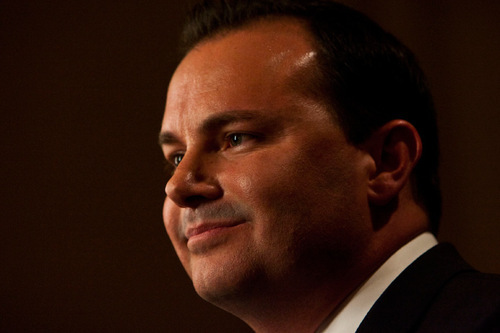This is an archived article that was published on sltrib.com in 2011, and information in the article may be outdated. It is provided only for personal research purposes and may not be reprinted.
Washington • The Senate overwhelmingly approved a debt compromise to increase the nation's borrowing power and cut spending down the road just hours before a do-or-die deadline Tuesday.
And in the process, Sen. Mike Lee watched as the best chance at achieving his top priority — a balanced-budget amendment — slipped away.
"The opportunity we had in connection with this debt limit increase was really our best shot," Lee said shortly before opposing the debt deal. "I am, of course, disappointed."
But the freshman senator is not defeated.
The debt deal won its final congressional approval on a Senate vote of 74 to 26, with Lee and his Utah colleague, Sen. Orrin Hatch, opposing the plan. It includes a requirement that the House and Senate hold votes on a balanced-budget amendment to the U.S. Constitution by the end of the year.
The version of the amendment Congress votes on will likely be significantly different than the one co-sponsored by Lee and Hatch, which has the backing of all 47 Senate Republicans. That amendment would eventually cap annual spending at 18 percent of the nation's annual production value, which would be a cut of about 7 percent from current levels. It would also block any tax increases unless approved by two-thirds of Congress.
Lee and Hatch tried to strong-arm their amendment through Congress, getting a small group of Republican lawmakers to vow to oppose any increase in the debt limit until Congress approved a balanced-budget amendment.
Lee argued it would be easier to get 20 Democrats to support his plan — the number needed to secure its passage if all Republicans support it — than it would be for Democrats to get seven Republicans to support an increase in the debt limit that didn't include a balanced-budget amendment.
Democrats, including President Barack Obama, brushed off the idea of a constitutional amendment requiring a balanced budget as unnecessary and restrictive.
As negotiations got closer to Tuesday's deadline to avoid the nation's first default, Republican leaders abandoned the call for quick passage of the amendment.
Lee said he has already started to regroup and reach out to Democrats to see whether he can find a way to make the constitutional amendment more politically palatable. He knows that gaining approval in a Democratic Senate this year is unlikely.
Balanced-budget amendments are not a new idea, as they have been tried and defeated for decades, including in 1997, when a Hatch-sponsored amendment failed by just one vote in the Senate.
"At the same time, I'm thrilled it has become part of the conversation," Lee said. "I think we are getting closer and closer to the point where it will pass."
Constitutional amendments require the support of two-thirds of the House and Senate. They then need the support of three-fifths of the states to be ratified, a process that could take years.
Twitter: @mattcanham



